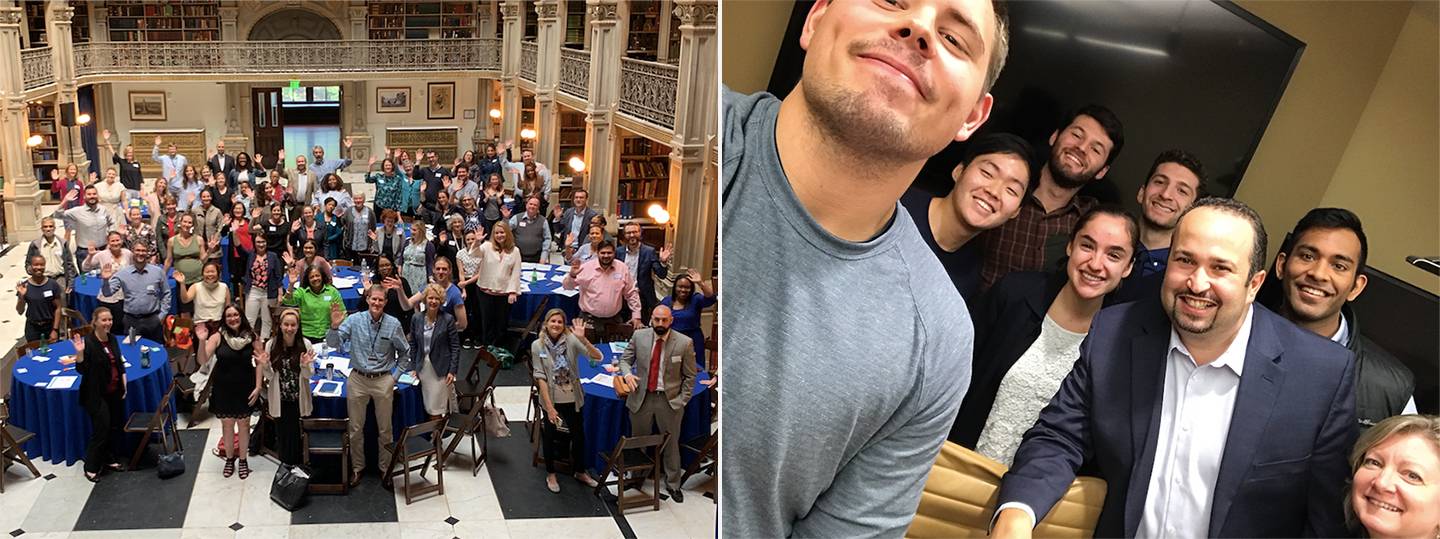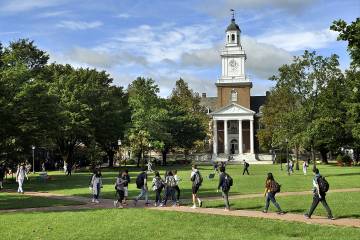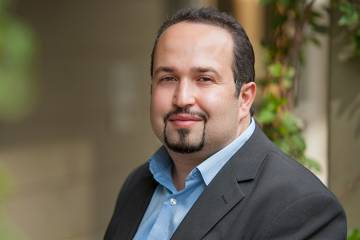Johns Hopkins University is planning a bold new approach to career development for students and alumni that includes opening three new administrative offices, launching new initiatives, and better integrating career and life design into the academic and co-curricular experience of all Hopkins students and postdocs.
The effort—informed by listening tours, focus groups, and faculty retreats conducted over the past year by Farouk Dey, who joined JHU as vice provost for integrative learning and life design in July 2018—signals a culture change in the way the university prepares students for life and careers.
"This announcement represents a major paradigm shift that comes as a result of extensive planning and thorough information gathering," Dey says. "I'm thrilled to launch these new programs that will dramatically transform the student experience at Johns Hopkins."
An expert in career design and experiential learning, Dey believes that traditional forms of career planning don't reflect how people actually find fulfilling jobs. Fewer professionals are building their lives and careers by planning them out step by step, he says, and most people would say they found their dream job by accident. Dey instead subscribes to the philosophy of life design, which aims to teach students that they should make decisions about their careers based on a thorough exploration of what inspires them and following through with action steps he calls "audacious moves." He explores these and other concepts in a February 2019 TEDx talk titled "Life Purpose Reconsidered."
Video credit: TEDx
The changes the university will implement this fall will not only shift the career planning culture in the direction of life design, but they will also help create more equitable and inclusive access to career opportunities for all Hopkins students and postdocs.
"Student services have traditionally been on the periphery of the college experience, and the onus has always been on students to visit these offices to receive services," Dey says. "But many students miss out on transformative opportunities in their personal and professional journeys because they don't have access to certain privileges or resources.
"Even something as simple as having a parent or sibling who has gone to college or having a network of people and mentors who can open doors for you can change a person's life in terms of their career. I'm on a mission to make pursuing life's purpose something that's accessible for all students, regardless of their background, field of study, or social capital."
To move the university toward a life design model, Dey will create three new offices and a series of initiatives and missions that will provide opportunities, mentoring, and networking to students, postdocs, and alumni. They include:
Hire Hopkins
Hire Hopkins will focus on developing relationships with employers from a wide variety of industries to enhance job recruitment opportunities for students at all nine academic divisions of the university. The office—launched in partnership with Christy Wyskiel, senior adviser to the president of Johns Hopkins University and head of Johns Hopkins Technology Ventures—will aim to streamline the interactions major employers have with the university to ensure that neither side misses an opportunity to connect a talented and qualified student with a potential job.

Image caption: The changes to the university's approach to career planning were informed by a 90-day listening tour that included focus groups with students and faculty retreats.
Image credit: Courtesy of Farouk Dey
Hopkins Connect
The goal of Hopkins Connect, says Dey, is to tap into the network of more than 220,000 Hopkins alumni and to engage them in mentoring and career guidance for current students. But in order to do that, he says, the university must also strengthen its commitment to providing career advancement for Hopkins alumni.
To that end, the office will be launched in partnership with Susan deMuth, assistant vice president for alumni relations. The office will include one initiative aimed at connecting students with mentors and another initiative to create career advancement resources and programs for alumni. This fall, the office will debut a robust, universitywide digital mentoring platform that will connect students, faculty, staff, and alumni in mentor/mentee relationships.
PHutures
The PHutures office will provide professional development, life design, and career connections for PhD students and postdoctoral fellows. This office will be launched in partnership with Nancy Kass, vice provost for graduate and professional education. It will aim to make available to the entire university the type of support and programming currently provided by the Professional Development and Career Office in East Baltimore, and Kass will help ensure that PHutures is integrated into the work of PhD advising faculty and into PhD programs. She will also help facilitate students input for the professional development programming that is offered.
"PhD students and postdocs have traditionally been served by models that were built for undergrads and master's students," says Dey. "But their goals and circumstances are dramatically different, and therefore their needs must be served differently. We're excited to offer them a program built for and designed to accommodate them."
Life Design Lab
Life Design Lab is the new name of the Homewood Career Center, which has been overhauled to reflect a new infrastructure and approach to its mission. Starting this fall, life design educators from the former Career Center will be embedded within academic departments and centers across the Whiting School of Engineering and Krieger School of Arts and Sciences, a change in approach that will allow students to more easily access life design programs and courses, experiential learning, and connections with alumni and employers.
The Life Design Lab will also operate SOAR, a new department focusing on inclusion and equitable access to opportunities for students from underrepresented communities, including first-generation, low-income, minority, LGBTQ, and international students. Educators who work for SOAR—short for Seizing Opportunities, Access, and Relationships—will be embedded in co-curricular and student life offices on the Homewood campus, including athletics, residence life, fraternities and sororities, and the Office of Multicultural Affairs.
Building on the work of the Student Services Excellence Initiative, Dey is working with university leaders to align similar transformations across the nine divisions.
"Our eight career centers are all doing an exemplary job at coordinating their efforts to make our collective vision come to life," Dey says.
These efforts include the redesign of the breakthrough curriculum at the Peabody Conservatory; the rebranding of the office of career services at the School of Nursing; the creation of GPS, short for Galvanizing Purpose Station, a 24/7 integrative learning environment for students and alumni in Advanced Academic Programs; the integration of life design and experiential learning at the Carey Business School; and the increased integration of career connections in academic programs at the School of Advanced International Studies.
A new hub for integrative learning
A center for integrative learning and life design is expected to open in spring 2020 in the former U.S. Lacrosse building located on the northern end of the Homewood campus, near Homewood Field. The building will be retrofitted and renovated to feature a modern, collaborative space that will house and bring together the Life Design Lab, the Office of Study Abroad, Student Employment Services, and the Hopkins Office of Undergraduate Research.
"The goal is to offer a space where students can interact with each other, as well as with alumni, employers, faculty, staff, and life design educators to find those moments of inspiration and opportunities for immersive, experiential learning," says Dey. "We are working on a plan to spread this concept throughout the nine divisions so that equitable access to immersive experience and mentoring becomes a standard feature of the JHU student journey."
The university already has begun recruiting and hiring executives and life design educators who will staff these new offices and initiatives.
"We're on a mission to transform our campus culture and to ensure that every student at Johns Hopkins has access to these services," Dey says. "Our entire plan—and our extensive approach—is built on a vision of equity and inclusion, and to me that is the kind of transformation students deserve at Johns Hopkins and at every university."
Correction: The number of Johns Hopkins alumni was misstated in an earlier version of this article. The Hub regrets the error.
Posted in University News
Tagged career center, integrative learning and life design, farouk dey









